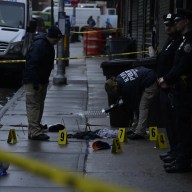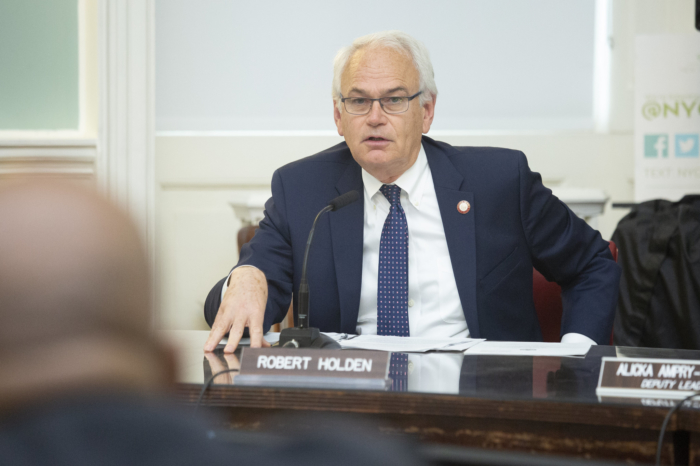By Kenneth Kowald
Some time in my studies of history — probably in Miss Drummond’s course on European History at Newtown High School — I learned about the Holy Roman Empire. I also heard, whether in that class or later at City College, that some wag (who turned out to be Voltaire) had said the HRE was neither Holy, nor Roman nor an Empire.
He was right, of course. You can look up the history of what has been called the Holy Roman Empire and I believe you’ll agree with him.
All this came to mind recently because of a Republican primary fight for a House of Representatives special election in, of all places, coastal Alabama. This is not an area I pay much attention to, generally speaking, but this primary was something else.
And, since that state, according to the latest figures I have found, gets back about $1.68 for every $1 it sends to the Federal government, all of us in Queens have a real financial stake in what goes on there. You and I are subsidizing them.
The “establishment” candidate won against a Tea Party type in a district where no Democrat has won in half a century. So, Bradley Byrne, a lawyer and former state senator, will join the GOP majority in the House. He reached out to his opponent, who, with the courtesy that is the hallmark of many of his ilk today, said that not only would he not vote for Mr. Byrne in the election, but he would not call him to concede defeat.
His graciousness is typical of his kind, wherever you find them. Look around to spot some.
After that, however, this very sore loser made a comment that, because of his defeat, it was the “end of a Western Christian empire.”
I was shocked, shocked by this remark.
I assume he was talking about the United States. I did not realize, until he enlightened me — as so many Tea Party members do about so many things I didn’t know — that the USA was Christian or an empire.
I can’t find much about Christianity in the documents which led to the rise of our nation. And, I never thought, if we ever even considered it — which I guess some did — that we would think of being an empire. They come and go, you know. You can look it up.
You can find out about the professed faith of our nation’s leaders by going on the internet and looking it up. Yes, up to the present time, they have all been Christians, of one stripe or another — and, there are many stripes — but I do not believe any of them ever made much about it.
As a professed Presbyterian, I am happy to report that Dwight Eisenhower, born into a Mennonite family, became a Presbyterian in early 1953 — probably a wise decision, since most presidents have been either Episcopalian or Presbyterian (at least up to now), but he never made much of it, although he did become active in the Gettysburg church in his retirement in that town.
FDR was an active member of the Episcopal Church and at one time a trustee at the Cathedral Church of St. John the Divine in Manhattan. He never spoke very much about his religious beliefs, as I recall. Rather, he displayed them in his actions.
The same holds for Abraham Lincoln, who had no affiliation with any established church, that I know of.
But the Tea Party’s unsuccessful very sore loser set me thinking about the whole matter of Faith and State. Note that I do not write Church and State, because I do not want to leave out synagogues, mosques, chapels, etc., etc. We are, in case some have forgotten, a rather polyglot nation.
What bothers me about Faith and State is not the actions of clergy types–as citizens. They can say anything they please and tout candidates until the cows (or the votes) come home. But, I believe, they cannot do that during religious services in their houses of worship. That, I believe, is against the law. And, you know, religious organizations do not pay taxes, so they, above all, should observe the law, wouldn’t you think?
However, let’s try to remember what went on in the recent elections in Queens. I believe a number of houses of worship were turning over part of their religious services to candidates for office. I feel sure that those of you who follow the news remember such things.
Have any of these places been called to task? I doubt it. So much for observing the laws of the land.
Of course, there is no reason why a candidate for public office should not visit a religious service, as long as he or she does not partake of the service as a soapbox for getting votes. Let me give you an example of how this can be done with decency, candor and due respect for the law by everyone involved.
In the first campaign between Rudy Giuliani and David Dinkins (which Dinkins won), a member of Giuliani’s staff called the pastor of the First Presbyterian Church of Forest Hills, the Rev. Charles E. Brewster, and asked if the candidate could attend a service. Of course, Mr. Brewster said, everyone is welcome to come to a service and participate as they may wish. But, Mr. Giuliani would not be recognized from the pulpit. He could mingle with the congregants at the after-service coffee hour, but not give a speech or distribute any campaign materials.
Mr. Giuliani and some of his staff came to a service, very much on time. They sat inconspicuously in the back of the sanctuary. They attended the coffee hour and chatted with some people. They left at a decent time.
No speeches. No campaigning. No breaking of the laws.
Mr. Brewster called the campaign of David Dinkins and extended the same kind of invitation for a convenient date. Mr. Dinkins did not take up the offer.
The founders of our country knew, either first-hand or by their studies of history — much of it very recent — that Faith and the State cannot be one in a democracy. They were right. Americans have profited from their commitment to religious liberty.
Next time you read of a candidate talking up a storm for votes in any religious ceremony, think about that. It’s in the First Amendment of the Bill of Rights, for very good reasons.
Let the clergy exercise every right they have as citizens. Let them also realize — always — that with those rights come responsibilities. That includes living up to the laws of the land.
As for politicians — of any faith or none — they might want to remember what a prophet said to his followers about 2,000 years ago or so, telling them not to display their faith on street corners, as hypocrites do. There followed his suggestion about how to pray — privately — with no one watching or hearing, except, perhaps, the deity you are praying to. You can look it up.
And may we all say “Amen,” in all languages and all faiths — even those who may not profess a faith.



































